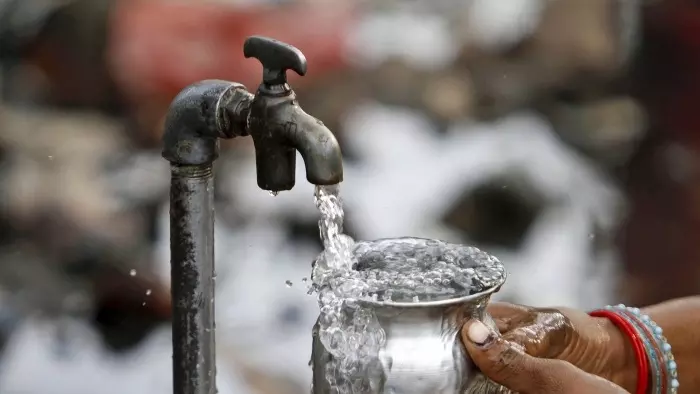
As of October 18, 2025, official data shows that out of West Bengal’s 1,75,52,365 rural households, 98,95,479 have access to tap water connections
Centre seeks action report on Jal Jeevan Mission lapses; Bengal calls it 'politically motivated'
With only 56.38 pc coverage under JJM, Union ministry asks Bengal for names of contractors, officials penalised for irregularities; information already shared, says state

With only approximately 56.38 per cent of rural households in West Bengal having access to piped drinking water under the Jal Jeevan Mission (JJM), the Centre has intensified its scrutiny of the project’s implementation in the state.
Central directive
The department of drinking water and sanitation (DDWS), which oversees the scheme under the ministry of Jal Shakti has issued a directive to the West Bengal government, asking for detailed reports on action taken against contractors and public officials found guilty of irregularities in the scheme.
The directive mandates the submission of names of contractors and third-party agencies penalised for substandard or irregular work, such as suspensions, dismissals, and FIRs filed against officials in departments like public health and engineering (PHE), an official of the department told The Federal.
In cases where FIRs have been filed, a one-page verified summary must also be provided, and to review data through "ground truthing" to confirm double entries, delays, non-implementation or over-designing of projects, the directive mentioned.
Centre vs state
The latest push for accountability has once again pitted the Centre against the state, with West Bengal minister Pulak Roy calling the move 'politically motivated'.
Also read: Jal Jeevan Mission: CM Siddaramaiah slams BJP for 'peddling lies'
The Centre maintained that the directive is aimed at ensuring financial transparency and strengthening quality control mechanisms at the grassroots level to expedite the implementation process of the scheme.
In response, the PHED sources claimed that the relevant information was already shared with the central authorities after the ministry made similar requests in April this year.
High-level review meeting
The latest push comes months after a high-level review meeting of the JJM was held on May 8, chaired by cabinet secretary T V Somanathan. After that meeting, the Centre deployed 100 inspection teams across the country to verify JJM implementation on the ground.
Four of these teams were sent to West Bengal in May this year. The teams conducted field inspections in six districts namely South 24 Parganas, Howrah, Bankura, Purulia, Malda, and Nadia.
Each team, comprising senior officials from various Union ministries, was tasked with assessing piped water schemes, filtration infrastructure, and service delivery in both arsenic-affected and general rural areas.
The JJM sources alleged that in many parts of the country, including West Bengal, the cost estimates of water supply projects appear to have been artificially inflated, suggesting a pattern of financial misreporting that the inspections aimed to uncover.
Also read: One Nation, One Water? Why Ladakhis are wary of Jal Jeevan Mission
A senior department official stated that the latest instruction is a continuation of the ongoing reporting process.
He added that this inspection should not be used as a pretext to withhold funds intended for the state, as has been the case with several central projects where the concerned ministry halted funding despite no substantive evidence of irregularities being found after multiple inspections.
BJP attacks TMC govt
The BJP, however, was quick to seize the opportunity to launch a scathing attack on the TMC government.
Opposition leader Suvendu Adhikari has accused the state government of turning the JMM into a mere dream for clean water.
Originally launched in 2019 by Prime Minister Narendra Modi, the JMM aimed to provide piped, safe drinking water to every rural household in the country by 2024.
JJM in Bengal
In non-hilly states like West Bengal, the financial burden is shared equally between the Centre and the state governments.
The initial project cost was pegged at Rs 3.60 lakh crore, with the Centre’s share estimated at Rs 2.08 lakh crore. However, due to missed targets and increasing infrastructure demands, the timeline has now been extended to 2028, and the revised cost estimate has swelled to Rs 8.20 lakh crore.
Also read: 72% households have drinking water facilities: Union Jal Shakti Minister
As of October 18, 2025, official data shows that out of West Bengal’s 1,75,52,365 rural households, 98,95,479 have access to tap water connections. The total number of functional household tap connections (FHTCs) provided so far stands at 96,83,630, with 2,00,792 connections delivered in the current financial year and 5,100 on October 18 alone.
While overall progress remains modest, some districts have performed better than others.
Nadia reached a coverage rate of 87.27 per cent earlier this year, followed by West Bardhaman at 70.77 per cent and East Bardhaman at 70.68 per cent.

